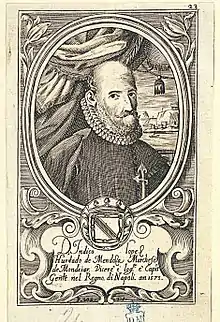Iñigo López de Mendoza y Mendoza
Íñigo López de Mendoza y Mendoza (1512 – Mondéjar, April 21, 1580[1]), was a Spanish noble, military, diplomat and politician in the service of King Philip II of Spain.

Biography
He inherited from his father Luis Hurtado de Mendoza y Pacheco the titles of 4th Count of Tendilla and 3rd Marquis of Mondejar. He became also 3rd and last Captain General of Granada. His mother was Catalina de Mendoza, daughter of the Count of Monteagudo. Íñigo married María de Mendoza, daughter of the very influential Íñigo López de Mendoza, 4th Duke of the Infantado.
In 1555, he became commander of the Spanish land and sea in the relief of the Turkish siege of Oran and Bugía. In 1560, he was Spanish Ambassador in Rome. He led the Spanish troops during the early stages of the Morisco Revolt together with Luis Fajardo, 2nd Marquis of los Vélez. The American historian Henry Charles Lea wrote of Mondéjar's "short but brilliant campaign... Through heavy snows and intense cold and over almost inaccessible mountains he fought battle after battle, giving the enemy no respite and following up every advantage gained. The Moriscos speedily lost heart and sought terms of surrender… By the middle of February [1569] the rebellion was practically suppressed."[2] Despite these successes, Mondejar was replaced in 1570 by Juan de Austria.[3] After the suppression of the rebellion, he became viceroy of Valencia in 1572, and Viceroy of Naples in 1575.[4]
He had 9 sons and two daughters, amongst whom
- Luis Hurtado (1543–1604), his successor.
- Francisco López de Mendoza y Mendoza, (1547-1623), Admiral of Aragon
- Juan Hurtado de Mendoza y Mendoza (1555–1624), married Ana de Mendoza y Enríquez de Cabrera, 6th Duchess of the Infantado
- Elvira (1565), married Pedro Álvarez de Toledo, 5th Marquis of Villafranca.[5]
References
- Fundación Medinaceli.
- Lea, Henry Charles: The Moriscos of Spain (1901), pp.241-242.
- Luis del Mármol Carvajal: Historia del rebelión y castigo de los moriscos del Reino de Granada.
- Virreyes de Nápoles de José Raneo, anotado por Eustaquio Fernández Navarrete, págs. 239–245, incluido en la "Colección de documentos inéditos para la historia de España", vol. XXIII.
- Nobleza española by Juan Miguel Soler Salcedo.